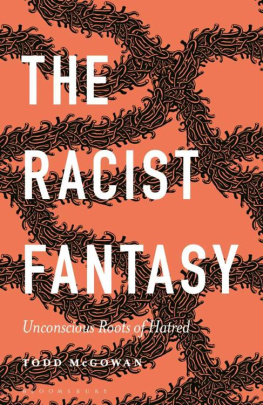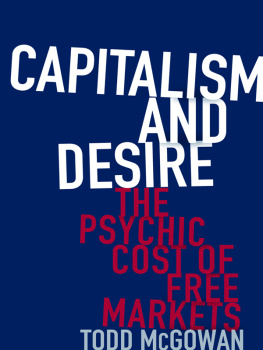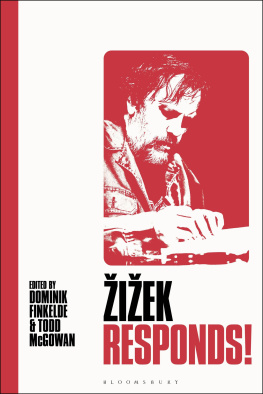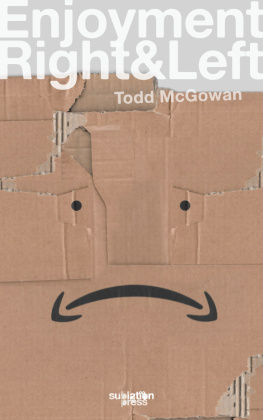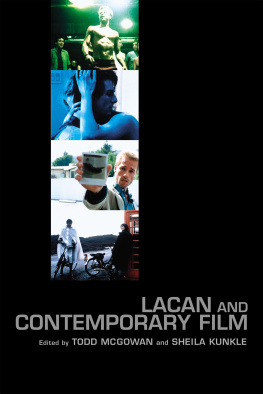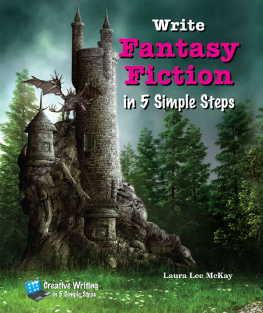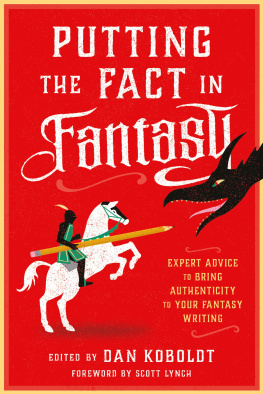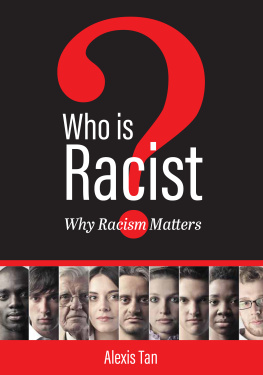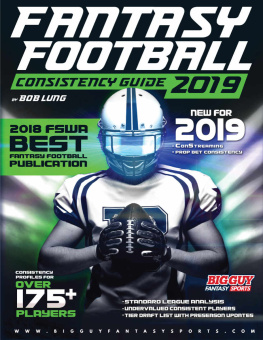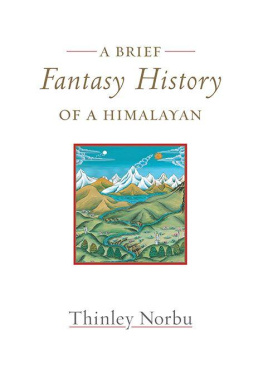The Racist Fantasy
Psychoanalytic Horizons
Psychoanalysis is unique in being at once a theory and a therapy, a method of critical thinking and a form of clinical practice. Now in its second century, this fusion of science and humanism derived from Freud has outlived all predictions of its demise. Psychoanalytic Horizons evokes the idea of a convergence between realms as well as the outer limits of a vision. Books in the series test disciplinary boundaries and will appeal to scholars and therapists who are passionate not only about the theory of literature, culture, media, and philosophy but also, above all, about the real life of ideas in the world.
Series Editors
Esther Rashkin, Mari Ruti, and Peter L. Rudnytsky
Advisory Board
Salman Akhtar, Doris Brothers, Aleksandar Dimitrijevic, Lewis Kirshner, Humphrey Morris, Hilary Neroni, Dany Nobus, Lois Oppenheim, Donna Orange, Peter Redman, Laura Salisbury, Alenka Zupani
Volumes in the Series:
Mourning Freud by Madelon Sprengnether
Does the Internet Have an Unconscious?: Slavoj iek and Digital Culture by Clint Burnham
In the Event of Laughter: Psychoanalysis, Literature and Comedy by Alfie Bown
On Dangerous Ground: Freuds Visual Cultures of the Unconscious by Diane ODonoghue
For Want of Ambiguity: Order and Chaos in Art, Psychoanalysis, and Neuroscience edited by Ludovica Lumer and Lois Oppenheim
Life Itself Is an Art: The Life and Work of Erich Fromm by Rainer Funk
Born After: Reckoning with the German Past by Angelika Bammer
Critical Theory Between Klein and Lacan: A Dialogue by Amy Allen and Mari Ruti
Transferences: The Aesthetics and Poetics of the Therapeutic Relationship by Maren Scheurer
At the Risk of Thinking: An Intellectual Biography of Julia Kristeva by Alice Jardine and edited by Mari Ruti
The Writing Cure by Emma Lieber
The Analysts Desire: Ethics in Theory and Clinical Practice by Mitchell Wilson
Our Two-Track Minds: Rehabilitating Freud on Culture by Robert A. Paul
Norman N. Holland: The Dean of American Psychoanalytic Literary Critics by Jeffrey Berman
Psychological Roots of the Climate Crisis: Neoliberal Exceptionalism and the Culture of Uncare by Sally Weintrobe
Circumcision on the Couch: The Cultural, Psychological and Gendered Dimensions of the Worlds Oldest Surgery by Jordan Osserman
The Racist Fantasy: Unconscious Roots of Hatred by Todd McGowan
The Racist Fantasy
Unconscious Roots of Hatred
Todd McGowan

For Ryan Engley
Who came from the same place
Contents
Thanks to Routledge for permission to publish a revised version of The Bedlam of the Lynch Mob: Racism and Enjoying through the Other, in Sheldon George and Derek Hook, eds., Lacan and Race: Racism, Identity, and Psychoanalytic Theory (New York: Routledge, 2021), 1934. If it still existed, Im sure that Culture Critique would have given me permission to publish a much-revised version of Fantasies of the Unsexualized Other, Or, The Navet of the Arab Mind. Culture Critique 1.2 (2009). Ill thank them in absentia. Furthermore, James Godley gave me a chance to work out some of these ideas in a talk at Dartmouth College, and Allan Pero did the same at the University of Western Ontario.
Haaris Naqvi at Bloomsbury has been incredibly supportive of this project from the moment I brought it to the press. I would also like to thank the Psychoanalytic Horizons series editors at BloomsburyMari Ruti, Esther Rashkin, and Peter Rudnytskyfor their enthusiastic embrace of the book, when a thoroughgoing rejection led me to believe that no one would find anything in it worth considering.
Thanks to my football teammates at Earlham College, who showed me how integrated intimacy might be tried. It was an interesting failure, because the interracial bond depended, unfortunately, on a shared and militant homophobia.
My mother, Sandi McGowan, taught me the importance of taking a stand against racism no matter what the personal cost. She endured mockery, ridicule, ostracism, and finally banishment from her in-laws thanks to her refusal to countenance their open displays of racism, but at no point did she relent in her critique of them, which had a decisive influence on me as a child. Whenever we left them, I would receive a lesson from her on the evil of their racism and its malignant effect on the world. For her trouble, my dying grandfather threw her out of his hospital room with the declaration, Sandi, this is for family only. He was a bigot right up to the end. She, on the other hand, chose universal nonbelonging over racist belonging. I suppose I should thank my fathers family as well, for giving me a firsthand look at how the racist fantasy delivered enjoyment to its adherents. Their obscene enjoyment was always instructive. My brother Wyk McGowan also took up the politics of antiracism since I can remember, undoubtedly due to our mothers influence.
My own in-laws, Jane Neroni and Del Neroni, have always been politically committed to fighting for equality, which is a not unpleasant surprise, given the usual contingencies that come with being related by marriage.
My twin sons, Dashiell and Theo Neroni, patiently guided me into the world of hip hop, but their guidance must have been tendentious because I somehow found myself at a heavy metal concert with one of them.
Certain people have made the University of Vermont a relatively hospitable place to write a book: Sarah Alexander, Andrew Barnaby, Emily Bernard, Bill Falls, John Waldron, and Hyon Joo Yoo. They are individually and collectively cogent arguments against relocation.
Bea Bookchin has been a role model for me on integrating theoretical speculation with practical politics. I was always almost convinced by her rejection of the state, but then something happened.
Thanks to LACK, which offers a non-place where theory counts more than status, where everyone is no one. Anna Kornbluh and Russell Sbriglia have been especially crucial in offering me thoughts that might derail this project in ways that it needed to be derailed. Our occasional online chats have thankfully replaced actual interpersonal interactions for me.
I appreciate the support of Clint Burnham, Joan Copjec, Matthew Flisfeder, Scott Krzych, Don Kunze, Juan Pablo Lucchelli, Hugh Manon, Quentin Martin, Jonathan Mulrooney, Carol Owens, Kenneth Reinhard, Frances Restuccia, Molly Rothenberg, Stephanie Swales, Louis-Paul Willis, Jean Wyatt, and Cindy Zeiher. They have helped to create a universe where theoretical speculation matters more than the banality of real life.
Thanks to Sheila Kunkle for batting around ideas with me about how to theorize the racist fantasy. She is one of those within the world of psychoanalytic thought committed on the ground to this fight, which she approaches like one of Alain Badious militants. Of course, she pays the price as a result.
I worked out many of the ideas in this book with my podcast partner, Ryan Engley. I appreciate him for knowing when to cut me off on the show. Unfortunately, that skill could not be employed with this book, which is why it has a certain endless quality to it.
Thanks to Slavoj iek for bringing the importance of enjoyment in racism to the fore and opening the door for so many of us. If Ive stolen some of his ideas here, its only fair.
As he is wont, Walter Davis read the entire book and had many corrections. If the book is now too correct, its his doing.
Jennifer Friedlander provided an invaluable reading that clarified the direction that I was taking to me, even when I didnt want to be taking it. Thanks to her and fellow comrade Henry Krips.
Next page
